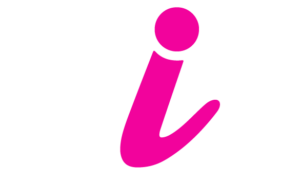Navigating the Workforce: Challenges and Triumphs for Women of Color
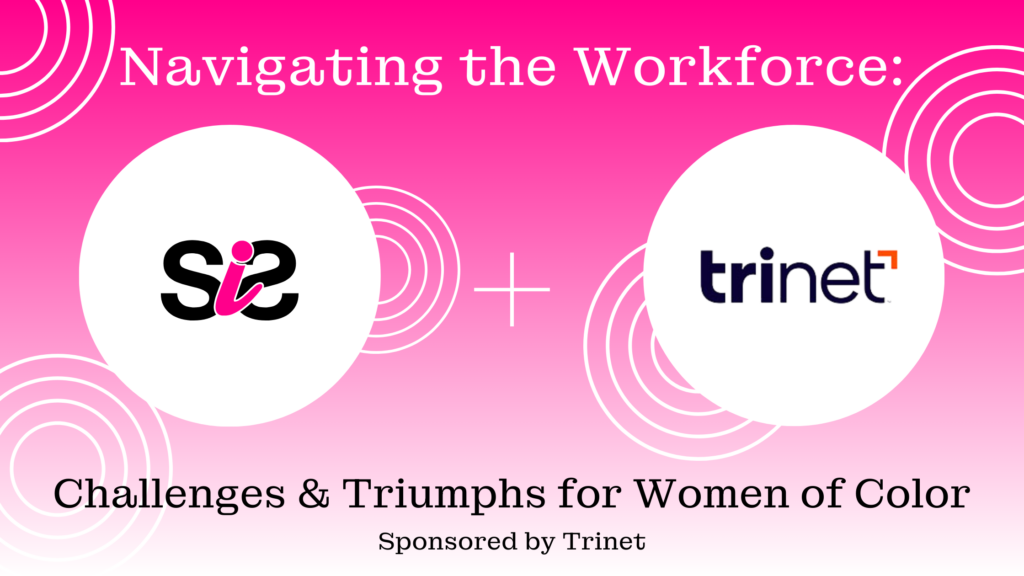
In today’s increasingly diverse workplaces, women of color bring unique perspectives, experiences, and talents to the table. However, they also face distinct challenges that can impact their career advancement and overall well-being. Let’s delve into the complexities of being a woman of color in the workforce, exploring both the hurdles they encounter and the triumphs they achieve. Five Common Challenges: Bias and Discrimination Women of color often confront systemic biases and discriminatory practices in hiring, promotion, and everyday interactions in the workplace. From microaggressions to overt acts of discrimination, navigating these obstacles can take a toll on their confidence and sense of belonging. Lack of Representation The underrepresentation of women of color in leadership positions and decision-making roles is a pervasive issue in many industries. The absence of role models and mentors who share similar backgrounds can make it challenging for women of color to envision their own paths to success and advancement. Intersectional Pressures Women of color face intersecting forms of discrimination based on both gender and race. This intersectionality compounds the challenges they encounter, as they must navigate the complexities of identity while striving to be seen and heard in predominantly white and male-dominated spaces. Wage Disparities Despite making significant contributions to their organizations, women of color often face wage disparities compared to their white counterparts and male colleagues. These disparities not only perpetuate economic inequality but also undermine their financial security and professional value. Tokenization In some cases, women of color may be tokenized or pigeonholed into diversity initiatives without being afforded meaningful opportunities for career growth and advancement. Being viewed solely through the lens of diversity can diminish their professional achievements and contributions. Five Positive Advantages: Resilience and Tenacity Despite facing numerous challenges, women of color demonstrate remarkable resilience and tenacity in the face of adversity. They draw strength from their cultural backgrounds, experiences, and support networks to navigate barriers and pursue their professional goals. Unique Perspectives Women of color bring diverse perspectives and insights to the workplace, enriching decision-making processes, innovation, and problem-solving. Their unique backgrounds and experiences enable them to offer fresh ideas and solutions that drive organizational success. Community and Support Building strong networks and communities of support is essential for women of color in the workforce. Through mentorship, allyship, and affinity groups, they find solidarity, guidance, and opportunities for professional development and advancement. Trailblazing Leadership Despite facing systemic barriers, many women of color emerge as trailblazers and leaders in their respective fields. Their trailblazing leadership inspires future generations of women of color and paves the way for greater diversity and inclusion in the workforce. Advocacy and Empowerment Women of color are powerful advocates for change, pushing for greater representation, equity, and inclusivity in the workplace. Through their advocacy efforts, they drive meaningful dialogue, policy reforms, and organizational initiatives that promote diversity and empowerment for all. Being a woman of color in the workforce comes with its share of challenges and triumphs. While systemic barriers and biases persist, women of color continue to defy expectations, break barriers, and drive positive change in their organizations and industries. By amplifying their voices, advocating for equity, and fostering inclusive workplaces, we can create environments where all women of color can thrive and succeed. Bios: Malori Gholar – Director, Sales With over 30 years of sales experience as both a top contributor and people leader, Malori Gholar is a dynamic Sales Leader and strategist specializing in People, Processes, and Performance. Her passion lies in connecting her clients’ unique needs to innovative technological solutions, driving exceptional results by aligning business goals with transformative opportunities. Malori takes pride in delivering superior client experiences, focusing on creating lasting impacts and elevating businesses to new heights. Guided by her mantra of excellence, she invests wholeheartedly in her clients, company, and colleagues, nurturing relationships built on trust and integrity. A strong advocate for equality and diversity, Malori is committed to making the world a better place, both in her professional and personal life. Her fierce dedication, unforgettable smile, and unwavering support for those in her circle make her a highly sought-after leader and collaborator, loved by those who work with her. Deanna Bernard- Director, Sales Award-winning sales leader with the big picture vision, and tenacity to successfully penetrate new markets, capture market share, and accelerate top and bottom-line revenue growth. Recognized for ability to build, guide, and sustain successful sales teams. Proven accomplishments in goal-oriented sales management through expertise in business development and strategic planning capabilities.
Understanding Macroeconomic Trends and their Sales Impacts
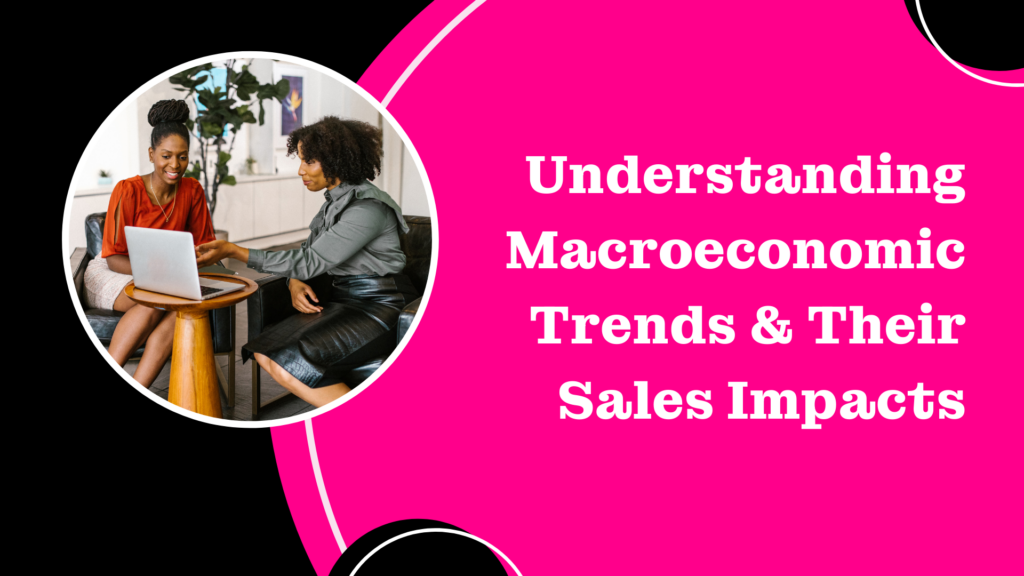
Sales is a complex world, and in order to succeed at it, navigating sales as a discipline requires much more than just persuasive skills and product knowledge. It involves understanding the broader economic environment that influences buyer behavior and market dynamics. Macroeconomic trends, such as GDP growth, unemployment rates, and inflation, shape the economic landscape, directly impacting sales strategies and outcomes. For women of color in sales and sales-adjacent roles, staying informed about these trends is not just beneficial—it’s essential for maintaining a competitive edge and adapting to ever-changing market conditions. What are Macroeconomic Trends? Macroeconomic trends refer to the overarching economic factors that impact the economy on a national or global scale. Key indicators include: GDP Growth: Measures the economic performance of a country. Strong GDP growth typically signals a healthy economy, increasing consumer spending and sales opportunities. (Here are the most recent GDP growth numbers for all major countries worldwide where salespeople may do business.) Unemployment Rates: High unemployment can lead to decreased consumer spending, affecting sales. Conversely, low unemployment often boosts consumer confidence and purchasing power. (Unemployment rates as of April 2024 for all major countries globally) Inflation: Rising prices can erode consumer purchasing power, impacting sales. However, moderate inflation can indicate a growing economy. (Current inflation rates by country) Monitoring these indicators helps sales professionals anticipate market shifts and adjust their strategies accordingly. The Rise of AI and Automation as a Macroeconomic Trend One of the most significant macroeconomic trends today is the rapid advancement of artificial intelligence (AI), automation, and machine learning. These technologies are transforming industries, including sales, on a global scale: AI in Sales: AI is transforming sales processes by providing predictive analytics, customer insights, and sales forecasting. Tools like SIS Summit 2024 Sponsor Apollo.io, or other sales-related AI tools like chatbots, virtual assistants, and AI-driven CRMs enhance customer interactions and streamline sales workflows. Automation and Machine Learning: Sales automation tools are becoming increasingly sophisticated, automating routine tasks such as lead scoring, email marketing, and follow-ups. This allows sales teams to focus on building relationships and closing deals. Machine learning algorithms are improving the accuracy of sales forecasts and personalizing customer interactions. Impact on Employment: The rise of AI and automation has led to significant shifts in skill requirements and has contributed to major layoffs in various sectors. For example, Intuit recently laid off 1,800 employees as part of their AI transformation strategy, underscoring the broader industry trend of workforce reduction due to technological advancements. Companies like Salesforce and HubSpot are leveraging AI to enhance their CRM capabilities, offering features such as predictive lead scoring and automated customer segmentation. The Impact of Economic Shifts on Sales Economic shifts, such as major layoffs and market volatility, have significant implications for sales: Layoffs and Workforce Changes: Recent trends have seen major layoffs in the tech and other sectors, leading to a shift in consumer behavior and spending patterns. Sales professionals need to be agile, focusing on high-value clients and diversifying their customer base. Action: Start building a more diverse client portfolio now to reduce dependency on any single industry. Invest in continuous learning to stay adaptable and update your skills regularly to remain relevant in a changing job market. Market Uncertainty: Economic uncertainty often results in cautious consumer spending. Sales strategies should emphasize value and cost-effectiveness, highlighting how products or services can solve immediate problems or provide long-term benefits. Action: Develop value-focused sales pitches and create case studies that demonstrate cost savings or ROI. Stay close to existing clients to understand their evolving needs and offer solutions that fit their current budget constraints. Adaptation Strategies: To navigate these challenges, sales teams should invest in training, embrace new technologies, and remain flexible in their approaches. Building a strong personal brand and leveraging a robust network can also provide stability and open new opportunities. Action: Enroll in professional development courses, particularly those focused on emerging sales technologies. Use social media to build your personal brand and actively engage with your professional network to discover new opportunities and share knowledge. Major Business Trends Changing the Sales Landscape Several business trends are reshaping the sales industry: Remote Work: The rise of remote work has transformed sales operations. Virtual meetings and digital communication tools are now essential for connecting with clients and colleagues. Action: Invest in reliable digital communication tools and set up a dedicated workspace to enhance productivity. Master virtual selling techniques by attending webinars or training sessions on how to effectively engage clients online. E-commerce Growth: The shift towards e-commerce has accelerated, requiring sales teams to adapt to digital sales channels. Understanding online consumer behavior and optimizing digital marketing strategies are critical. Action: Learn about e-commerce platforms and how they can be integrated into your sales strategy. Collaborate with your marketing team to develop targeted online campaigns that drive traffic and convert leads into sales. Customer Expectations: Modern customers expect personalized and seamless experiences. Sales professionals must leverage data to understand customer needs and tailor their approaches. Action: Utilize CRM systems to track customer interactions and preferences. Personalize your outreach by using data analytics to identify customer pain points and tailor your solutions accordingly. Globalization: As businesses expand globally, sales teams must navigate different cultural norms and market dynamics. This requires a nuanced understanding of international markets and localized strategies. Action: Educate yourself on the cultural and economic nuances of the regions you are targeting. Develop localized sales strategies that respect cultural differences and meet the specific needs of each market. Preparing for Future Trends To stay ahead, sales professionals should focus on continuous learning and proactive adaptation: Continuous Learning: Keep up with industry trends, attend webinars, and participate in training programs to stay informed and develop new skills. Subscribe to industry newsletters, follow thought leaders on social media, and join professional organizations that offer educational resources (like SIS!) Networking and Collaboration: Engage with industry peers, join professional groups, and participate in networking events. Building a strong professional network provides support and opens up new opportunities. Attend
Effective People Management Skills for Sales Leaders
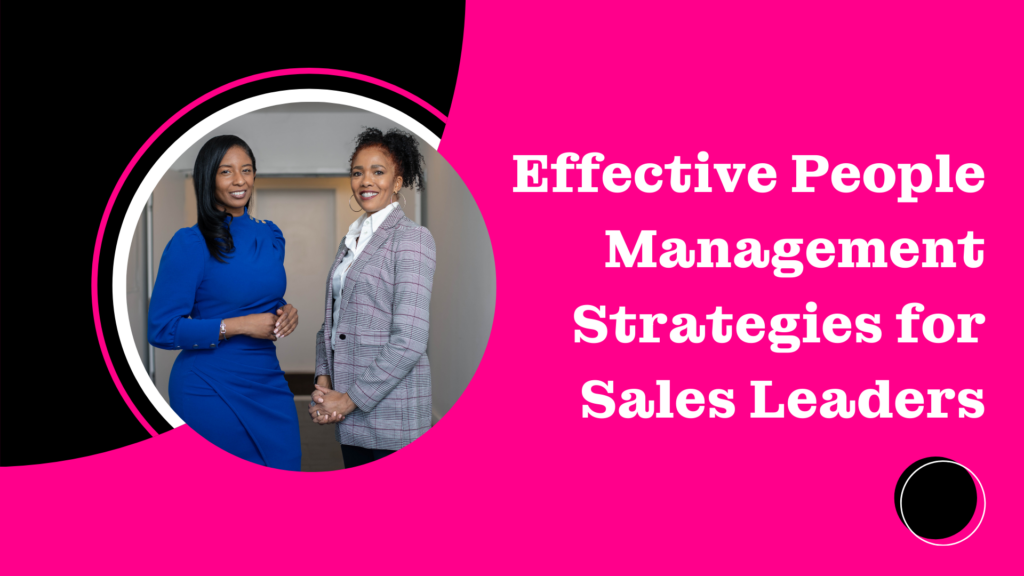
Transitioning from a successful individual contributor in sales to a sales leader is a significant milestone. While excelling in sales requires strong personal skills and determination, managing a team demands a different set of capabilities. Developing people management skills is essential for training and transferring knowledge, motivating the team, and achieving outstanding results. Understanding the Transition from Sales Success to People Management Moving from individual sales success to managing a team can be challenging. It requires shifting focus from personal achievements to fostering an environment where the team can thrive. This transition involves understanding the dynamics of the team, recognizing strengths and weaknesses, and learning how to guide the team towards collective success. Developing effective people management skills is key to making this transition smoothly. Key People Management Strategies Building Strong Relationships: Developing trust and rapport with team members is essential for any sales leader. Open and honest communication creates a positive and inclusive team culture. Regular one-on-one meetings, active listening, and providing support build strong relationships that motivate the team to perform at their best. Investing time in getting to know each team member personally helps in understanding their individual motivations, strengths, and areas for improvement. Hosting team-building activities and social events can further strengthen these relationships and foster a sense of unity and collaboration. Setting Clear Expectations and Goals: Clear expectations and goals are vital for any team’s success. Implementing SMART goals (Specific, Measurable, Achievable, Relevant, Time-bound) aligns the team’s efforts with organizational objectives. Consistent communication ensures everyone understands their role in achieving the team’s goals. It’s important to regularly review and adjust these goals based on performance and changing circumstances. Encouraging team members to set their own personal development goals in alignment with team objectives can also drive individual accountability and commitment. Providing Regular Feedback and Coaching: Feedback and coaching are crucial for continuous improvement. Constructive feedback should focus on specific behaviors and outcomes, offering actionable advice. Effective coaching helps team members enhance their skills, understand their strengths, and work on areas needing improvement. Scheduling regular feedback sessions, rather than waiting for annual reviews, ensures continuous development. Utilizing tools like 360-degree feedback can provide comprehensive insights from multiple perspectives, helping team members understand their performance from different angles. Recognizing and Rewarding Performance: Recognition and rewards play a significant role in motivating the team. Implementing a fair and transparent recognition program that includes both monetary and non-monetary rewards is key. Celebrating successes publicly ensures that every team member feels valued for their contributions. Personalizing recognition to match individual preferences—some may prefer public acknowledgment, while others might appreciate private praise—can enhance its impact. Creating a culture of peer recognition, where team members also acknowledge each other’s efforts, fosters a supportive environment. Developing and Training the Team: Continuous learning and development keep the team competitive. Identifying training needs through regular assessments and providing relevant resources is essential. Encouraging knowledge sharing and creating opportunities for team members to learn from each other fosters a culture of continuous improvement. Offering access to external training programs, industry conferences, and professional certifications can further enhance their skills. Implementing mentorship programs within the team can also facilitate knowledge transfer and provide additional support for career development. Managing Conflict and Difficult Situations: Conflict is inevitable in any team. Addressing conflicts promptly and effectively is crucial for maintaining team harmony. Understanding the root causes, mediating impartially, and working towards resolutions that respect everyone’s perspectives maintain a harmonious team environment. Handling difficult conversations with empathy and professionalism is key. Providing training on conflict resolution and communication skills can equip team members with the tools to handle disputes constructively. Establishing clear protocols for conflict resolution ensures consistency and fairness in addressing issues. Empowering the Team and Promoting Autonomy: Empowering team members to take ownership of their work leads to higher engagement and productivity. Delegating tasks and responsibilities appropriately and trusting the team to make decisions fosters a culture of autonomy and accountability, encouraging innovation and growth. Encouraging a growth mindset, where team members view challenges as opportunities to learn and develop, can further enhance their sense of ownership. Providing resources and support for their initiatives shows trust and fosters an environment where creativity and proactive problem-solving are valued. Measuring Success and Adjusting Strategies: Regularly tracking team performance and gathering feedback ensures the effectiveness of people management strategies. Key metrics might include sales performance, employee satisfaction, and team cohesion. Using this data to adjust strategies addresses any areas that need improvement. Implementing regular team meetings to review progress and discuss any challenges helps in staying aligned with goals. Encouraging an open feedback culture, where team members feel comfortable sharing their thoughts and suggestions, can provide valuable insights for continuous improvement. Effective people management skills are crucial for sales leaders who want to translate their individual success into team success. Building strong relationships, setting clear goals, providing feedback, recognizing performance, developing the team, managing conflict, and promoting autonomy create a high-performing sales team. Joining the SIS community and attending the 7th Annual SIS Summit offers the opportunity to network with other sales leaders and learn from industry experts.Together, leadership skills can be elevated, driving teams to success!
The Future of Sales: How AI is Transforming the Industry
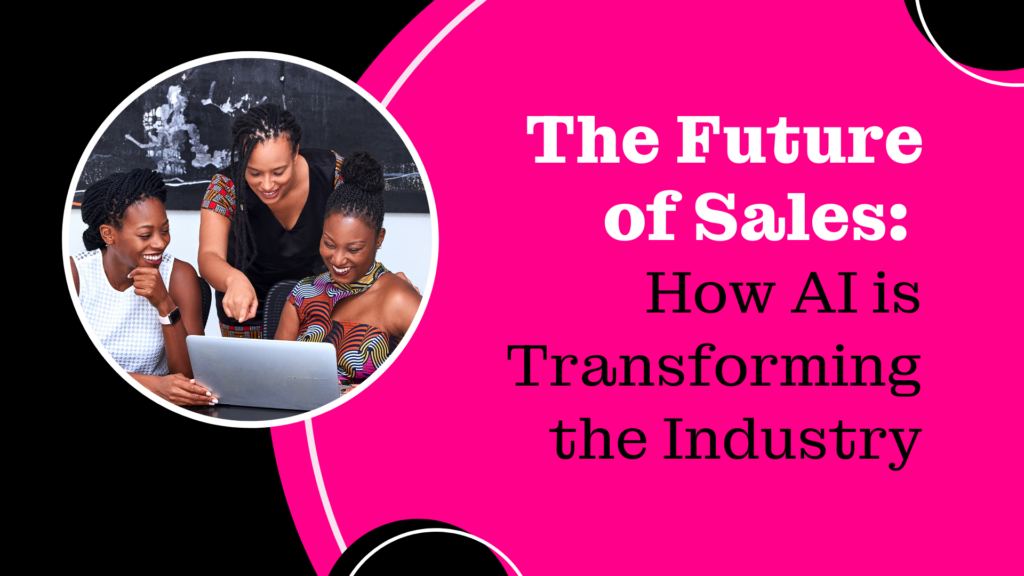
Artificial Intelligence (AI) is revolutionizing industries across the globe, and sales is no exception. As advances are made, the impact of AI on sales processes, productivity, and customer engagement is becoming increasingly significant. Understanding these changes and leveraging AI effectively in sales can provide a competitive edge. This blog explores the latest updates on AI in sales and offers actionable recommendations for salespeople and sales leaders to implement right away. Understanding AI and Its Capabilities in Sales AI in sales refers to the use of machine learning, natural language processing, and predictive analytics to enhance various aspects of the sales process. From automating routine tasks to providing deep insights into customer behavior, AI is transforming how sales teams operate. Current trends include AI-driven chatbots, advanced CRM systems, and predictive analytics tools that forecast sales outcomes with unprecedented accuracy. AI-Driven Sales Processes Lead Generation and Qualification: AI automates lead generation and scoring, ensuring that sales teams focus on the most promising prospects. Tools like HubSpot and Salesforce Einstein use AI to analyze vast amounts of data and identify high-quality leads. By implementing AI-powered lead scoring tools, sales teams can prioritize high-quality leads and focus their efforts more efficiently based on how qualified their prospects are. Sales Forecasting: AI enhances the accuracy of sales forecasts by analyzing historical data and current trends. Tools such as Clari and Aviso provide detailed sales predictions, helping teams plan more effectively. Utilizing AI-driven analytics helps refine sales forecasts, allowing for better planning and resource allocation. Personalized Customer Engagement: AI personalizes customer interactions by analyzing behavior and preferences. Tools like Drift (SalesLoft) and Conversica create tailored email campaigns and sales pitches, enhancing customer engagement. Research shows that personalized emails outperform emails that lack personalization, drawing a very strong 41% click-through rate on average when an email is properly personalized. Leveraging AI to create personalized email campaigns and sales pitches can resonate more effectively with individual customers. Enhancing Sales Productivity with AI Automating Administrative Tasks: AI reduces the time spent on administrative tasks by automating data entry and task management. CRM systems like Zoho and Pipedrive use AI to streamline these processes by automatically logging communications, updating customer records, scheduling follow-ups, and providing intelligent task reminders based on previous interactions, freeing up time for more strategic activities. Adopting AI-powered CRM systems automates routine tasks, allowing sales teams to focus on high-value activities. Intelligent Sales Assistants: AI assistants provide real-time insights and support during sales calls. Tools like Gong and Chorus (ZoomInfo) use AI to analyze conversations and offer actionable advice. Integrating AI sales assistants enhances the effectiveness of sales calls by providing real-time insights and support. Improving Customer Insights and Analytics Predictive Analytics for Customer Behavior: AI predicts customer behavior and preferences by analyzing data from various sources. Tools like InsideSales and Infer provide insights that help tailor sales strategies to individual customers. Predictive analytics works by examining past customer interactions, purchasing patterns, and other relevant data to forecast future behavior. This allows sales teams to anticipate customer needs, tailor their messaging, and time their outreach more effectively. Using predictive analytics to refine sales strategies enables more precise targeting of customers based on their predicted behavior, ultimately increasing the likelihood of successful conversions. Sentiment Analysis: AI analyzes customer sentiment from communications and feedback, providing a deeper understanding of customer emotions. Implementing sentiment analysis tools helps better understand and respond to customer emotions, improving overall customer satisfaction. AI for Sales Training and Development AI customizes training content based on individual needs and performance. Platforms like Lessonly (Seismic) and MindTickle use AI to analyze each salesperson’s strengths, weaknesses, learning pace, and preferences. By doing so, these platforms can recommend specific modules, exercises, and resources tailored to address individual gaps and enhance existing skills. This personalized approach ensures that training is relevant and engaging for each learner, leading to better retention and application of knowledge. Utilizing AI-driven training platforms delivers tailored training programs that address specific skills and knowledge gaps, resulting in more effective and efficient learning outcomes. AI is undeniably transforming the sales industry, offering tools and insights that enhance efficiency and effectiveness. Salespeople and sales leaders who embrace these technologies and adapt their strategies accordingly will be better positioned to succeed in a rapidly evolving landscape. By leveraging AI for lead generation, sales forecasting, customer engagement, and training, teams can achieve greater productivity and drive better results. Stay ahead of the curve and join the SIS community to learn more about AI in sales. Register for the 7th Annual SIS Summit today to network with industry experts and gain valuable insights into how AI can revolutionize your sales strategies. Don’t miss out on this opportunity to elevate your sales leadership skills and drive your team to success.
The Power of Networking for Sales Success

Success in sales doesn’t just look like closing deals; it’s also about building a robust network that can support and propel your career forward. Networking is crucial for sales success, and for sustained achievements, offering opportunities for mentorship, partnership, and personal growth. Research from November 2023 shows that “companies whose real-world employee connections put them at the center of their professional communities performed better than peer companies whose workforces were less well-connected and, as a result, on the periphery of the same community.” Understanding the Importance of Networking Building a strong network is a powerful strategy that can significantly impact your sales career. By connecting with others, sharing knowledge, and leveraging relationships, you gain access to valuable resources, industry insights, and potential career opportunities. Networking is essential for sales success, as well as continued growth and achievement in your field. Overcoming Challenges in Networking Women of color often face unique challenges in networking, such as underrepresentation, implicit bias, and a lack of relatable role models – women of color only hold 10% of senior manager and director-level titles and 5% of C-level roles across all industries and departments nationwide. It’s not uncommon to feel like the only person in the room who looks like you, which can be intimidating and isolating. That’s why SIS was created – to build a community where women who felt alone in their professional environments could find support and solidarity. Strategies for Overcoming Challenges: Find a Mentor: Seek out mentors who can provide guidance and support. Mentors can offer valuable advice and help you navigate your career. (Hint: the majority of SIS members hold senior-level roles in their companies – what powerful women to learn from!) Join Professional Groups: Engage with professional organizations like SIS that offer networking opportunities tailored to your needs. Leverage Online Platforms: Utilize LinkedIn and other social media platforms to connect with industry professionals and join relevant groups. Effective Networking Strategies Networking Outside Your Workplace: Building Genuine Connections: Focus on creating authentic relationships rather than superficial contacts – don’t seek out people just to sell to, but to prioritize a lasting and genuine connection. These more sincere, less self-serving connections lead to long-lasting professional relationships; even if they don’t buy from you, they may be willing to refer their network to you if they trust you! Attend local industry meetups, engage in community events, and seek out meaningful interactions. Utilizing Social Media: Use platforms like LinkedIn and Instagram to connect with industry leaders, participate in discussions, and stay updated on industry trends. Regularly share insightful content, join relevant groups, and engage with posts from other professionals to increase your visibility. Attending Industry Events: Participate in conferences, webinars, and networking events, such as SIS events, to meet new people and expand your network. These events offer unique opportunities to learn from experts, discover new trends, establish connections with potential clients or collaborators, and maybe even find your next career opportunity! Follow-Up: After meeting new contacts, follow up with them to maintain and strengthen the relationship. Send personalized messages, set up coffee meetings, or invite them to relevant industry events to keep the connection active. Networking Inside Your Workplace: Climbing the Ladder: Networking within your organization can lead to promotions and career advancements. Connect with colleagues across different departments to broaden your internal network. Attend company events, join internal committees, and actively participate in team projects to showcase your skills and commitment. Expanding Horizons: Build relationships with peers in other roles or departments to gain a broader perspective and potentially transition into new positions. Engage in cross-functional projects, seek opportunities for collaboration, and be open to learning from colleagues in different areas. Long-Term Relationships: Cultivate long-term relationships with colleagues and leaders who can provide ongoing support and mentorship. Regularly check in with mentors, offer support to peers, and participate in mentorship programs to foster a supportive work environment. Leveraging SIS for Networking The SIS community is thriving and ready for you to jump in, learn, meet people, and grow your career. Membership is what you make of it, and everyone in the community wants to see each other succeed. A rising tide lifts all boats, and by supporting each other, we all grow stronger together. Community Benefits: Exclusive Events: Access to members-only events that provide networking opportunities with industry leaders and peers. Mentorship Programs: Opportunities to find mentors and become a mentor, fostering a supportive environment for career growth. Active Forums: Engage in discussions, share experiences, and gain insights from other members in our exclusive SIS-members-only platform. Building Your Personal Brand A strong personal brand can enhance your networking efforts by making you more recognizable and memorable. It showcases your expertise and values, making it easier for others to connect with you. Tips for Building a Brand: Professional Online Presence: Develop a consistent and professional online presence on platforms like LinkedIn. Ensure your profiles are up-to-date, highlight your achievements, and use a professional photo. Share Industry Insights: Regularly post and share valuable content related to your field to position yourself as a thought leader. Write articles, share relevant news, and provide commentary on industry developments. Engage with Others: Actively engage with others’ content by commenting, liking, and sharing, to increase your visibility. Participate in discussions, congratulate others on their achievements, and offer support or advice when appropriate. Networking for Career Advancement Networking can be a powerful tool for career advancement in sales, whether you are seeking a promotion, transitioning to a new role, or looking for mentorship opportunities. Building strong relationships within your organization can provide the support and guidance needed to advance your sales career. Key Benefits: Promotions and Career Growth: Effective networking can lead to recognition and promotion opportunities. By demonstrating your skills, building a strong professional reputation, and connecting with decision-makers, you can enhance your career prospects. Support and Guidance: Long-term professional relationships provide continuous support and valuable career advice. Having a network of trusted advisors can help you navigate challenges, identify new opportunities, and make informed decisions. Mentorship
Leveraging AI for Sales Success: Practical Strategies & Tools
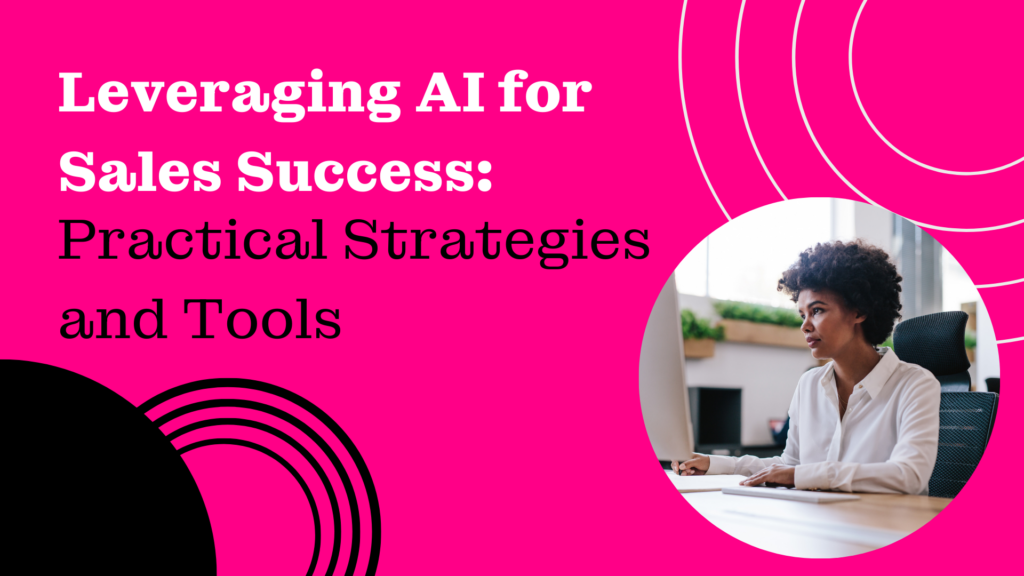
AI and natural language models are experiencing exponential growth, disrupting nearly every industry worldwide. This rapid advancement in technology has immense potential to revolutionize sales departments and individual sales professionals’ daily work. AI can give saleswomen a competitive edge, streamline processes, and enhance productivity. Artificial Intelligence (AI) is revolutionizing the sales industry, offering powerful tools and strategies to enhance efficiency, personalize customer interactions, and drive better outcomes. Understanding and leveraging AI for sales can significantly impact success, making it a critical component of modern strategies. Understanding AI for Sales AI in sales involves using machine learning algorithms and data analysis to optimize various aspects of the sales process. This technology can streamline tasks, provide valuable customer insights, and predict future sales trends, ultimately driving increased efficiency and effectiveness. The benefits of AI for sales include improved lead generation, enhanced customer personalization, and accurate sales forecasting. Practical Strategies for Leveraging AI for Sales Strategy 1: AI for Lead Generation AI can identify and prioritize leads more effectively than traditional methods. By analyzing vast amounts of data, AI tools can pinpoint potential customers who are most likely to convert, saving time and resources. Popular tools for AI-driven lead generation include Microsoft Co-Pilot, Salesforce Einstein, HubSpot, Apollo.io and Marketo. These tools utilize predictive analytics to score leads, ensuring sales teams focus on the most promising opportunities. Strategy 2: AI for Sales Forecasting Accurate sales forecasting is essential for planning and strategy. AI can predict sales trends and outcomes by analyzing historical data and market conditions. Tools like Aviso, Clari, and Anaplan provide predictive insights that help sales leaders make informed decisions, allocate resources efficiently, and set realistic targets. Strategy 3: AI for Customer Insights and Personalization Personalizing customer interactions is crucial for building strong relationships and driving sales. AI can analyze customer behavior and preferences, allowing sales teams to tailor their pitches and communications. Top AI Tools for Sales Leaders CRM Systems with AI Capabilities AI-enhanced Customer Relationship Management (CRM) systems offer numerous benefits, including automated data entry, lead scoring, and personalized communication. Examples include Salesforce Einstein and Zoho CRM, which integrate AI to provide actionable insights and streamline sales processes. AI-Powered Sales Assistants AI-powered sales assistants can automate repetitive tasks, allowing sales professionals to focus on high-value activities. Tools like Clara and Conversica handle tasks such as scheduling meetings and following up with leads, improving efficiency and productivity. AI for Sales Analytics Data-driven decision-making is critical for sales success. AI tools like Gong.io and Chorus.ai analyze sales calls and interactions, providing insights into customer sentiments, objections, and preferences. These insights help sales teams refine their strategies and improve their performance. Implementing AI for Sales Success Integrating AI tools into existing sales workflows involves several steps. First, identify the areas where AI can have the most significant impact, such as lead generation or sales forecasting. Next, select the appropriate tools and ensure that the sales team receives adequate training and support. Finally, measure the impact of AI on sales performance to refine and optimize its use continually. Building a strong AI-driven sales strategy can transform the sales process, driving better outcomes and increasing efficiency. By understanding and leveraging AI for sales, professionals can stay ahead of the competition and achieve greater success. Learn much more about how to use AI at the 7th Annual SIS Summit, coming up in September. Buy your ticket while they’re still available!
Navigating Career Challenges: Building Resilience in Sales
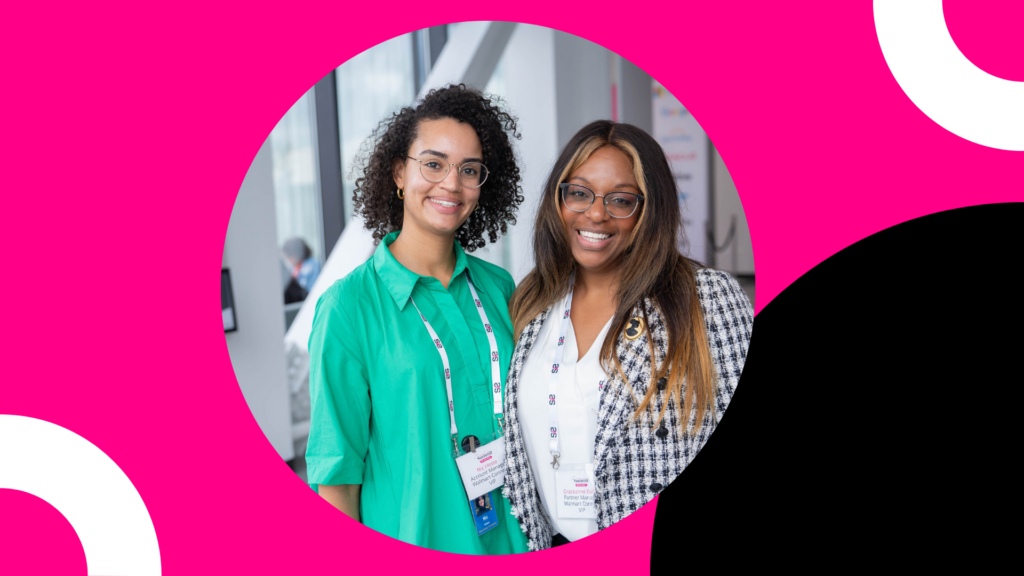
In the fast-paced world of sales, resilience is essential. Sales professionals, especially women of color, often face unique career challenges that test perseverance and determination. With the right strategies, these obstacles can become opportunities for growth and success.
Sell into the C-Suite: The Secret to a Masterful Value Story

In the summer of 1996, I was on sabbatical in Guatemala with my family. We lived like locals, sharing a cramped four-bedroom, two-bathroom home with a Guatemalan family of twelve. Both my daughters attended the neighborhood school and made friends with the kids on our block. Before the sabbatical, our family only spoke English, so imagine my surprise when both my girls became confident Spanish speakers in a matter of weeks! My oldest, at eleven, could hold entire conversations in the language while my youngest, age three, became fluent. Their immersion in the local community allowed them to pick up Spanish with ease, clearly communicating with friends and learning alongside their peers in class. My daughters’ language immersion experience perfectly illustrates the secret to creating a masterful value story. To maximize your impact, you have to immerse yourself in the customer’s world and learn their language. Become a student of your client, their company, and their industry. Research your clients’ words and numbers so you can think and speak like them. Quantitative Analysis Tips For quantitative analysis tips, check out my blog post The Most Important Client Document You’ve Never Read and register for the Sistas In Sales Upcoming Sales Mastery Webinar: Becoming An Empathic Seller Using Financial Insights. For your qualitative analysis, search for themes, patterns, or movements, and identify the Pain, Opportunities, and Problems (POP). Find what POPs! Here are easy three steps to start your journey into your client’s world: By immersing yourself in the customer’s world and understanding their perspective, you will learn to analyze and think like them. With this information, you can tailor and develop a killer value story. A powerful value story changes everything; it gives you the confidence to talk to anyone about what you do and sell into the C-suite. Here’s to selling Mastery. -Cherilynn Head of Education and Growth, Sistas In Sales Cherilynn Castleman, Sales Trainer/Executive Coach, has been a sales executive for 20+ years, a natural talent for teaching and a drive to sell, Cherilynn uses her skills to coach and train other sales professionals.
How Soft Skills Can Make You a Better Sales Engineer

Alyson Schreider, Sales Engineering Manager at SalsifyThis interview was edited for length and clarity One look at Alyson Schreider’s resume is all you need to know that she is a talented woman with a wealth of experience. As a Sales Engineer at Salsify, Alyson leads a team of driven individuals dedicated to making the ecommerce experience more efficient and user friendly, for brand manufacturers and their customers. Prior to stepping into this leadership role, Alyson worked as a Sales Engineer for six years and has since developed a knack for meeting the needs of her clients, team, and leadership with courage, vulnerability, and spunk. You might be wondering – how did Alyson manage to create such a successful career in a role that is largely dominated by men, in an already male dominated industry? To answer this question, we must look back to a professional experience Alyson had that was unlike any other experience in her career. Some of the skills that Alyson has relied on to succeed as a Sales Engineer include the ability to temper expectations, being honest about one’s limitations, and being determined enough to get better. These skills enabled her to excel at leadership and build a meaningful and impactful career. When asked how she developed these skills and her advice for other women interested in a Sales Engineer role, Alyson pointed to a life changing experience that shaped her into the professional she is today. “I learned these skills when I worked in public safety with police officers because there were actually life and death situations – in 911 dispatch, you have to make sure all the systems are working at all times and so I got really good at providing and managing expectations in some pretty stressful situations.” This ability to assess and manage expectations while clearly and honestly relaying information proved to be a powerful skill – not only in her job in public safety, but also throughout her entire career. But it wasn’t just this ability that helped shape her into the dynamic professional she is today. “I realized that the more I communicate and the more I’m honest about what I am doing or what I can or can’t do, the more people meet you where you are. Then, I’m able to find out what I need to know quickly.” Alyson learned early on in an unexpected professional experience, what was needed to be an effective sales engineer: tempering expectations, communicating clearly, and resolving to learn that which is unknown at the moment. This story proves two things – first, it shows that skills can be learned in any environment and used in any role. Second, it shows that having the courage and vulnerability to admit what you do and do not know while resolving to learn and grow, will make you far more successful as a Sales Engineer than you might initially think. Alyson further corroborated these two points when asked to share her insight on how one can successfully transition into a pre-sales role and what skills are needed to do so. “I think the desire to dig in and work hard, be curious with customers, be empathetic, and ask questions will help you understand what you need.” Alyson went on to encourage those that are interested in applying for a Sales Engineer role not to be discouraged by the technical side of the job as she continued to highlight the value that soft skills bring to the role. “Being willing to build and create relationships with customers is really important. Technical aptitude depends on what we’re looking for at the time – sometimes we want someone really technical and sometimes we don’t. Other times, we want someone that’s great at building relationships, becoming the trusted advisor to a customer and willingness to learn the technical side. The key is to go for it – don’t be afraid to fail.” While Alyson’s experience in public safety helped prepare her for her job as a Sales Engineer today, it wasn’t the only influence on her career. When asked what enabled her to effectively do her job, Alyson shared the following insight: “All of the different work I’ve done with customers and being around and understanding different types of personalities and how to communicate with them really helped me. You have to understand that you can’t just go in with the same approach with every single person.” Alyson managed to pull skills from various client facing professional experiences to empower her to succeed in her current role, and it’s something we can all learn to do as well. Finding The Right Fit Finding transferable skills to help Alyson excel in her role was paramount to her success, but it isn’t the full picture. Without the support and empowerment of her company, Alyson might not have had the opportunity to put those skills she developed over the years to good use. “I had previously worked at a company that was very team oriented and collaborative…it was very fun and dynamic…it was really a great place to work…it was a family type environment so I was looking for something similar, and a product that I could really get behind…so when I joined, that’s exactly what Salsify ended up being. I wanted a team where everyone was helpful to each other.” Alyson went on to share how the support at Salsify gave her the opportunity to grow and go for opportunities she might otherwise not have access to without the support of her leadership “…I had been thinking I wanted to be a manager, and I told my leadership [about this before there was an opening] and they shared that there would be an opening within a month” “They’re very encouraging of [helping you] try something else. There’s movement whether it’s upward or laterally based on what you want to do.” Even without formal experience as a Sales Engineer, that shouldn’t deter women from exploring pre-sales as a career option, as there are
A Step-by-Step Resume Guide for Aspiring Sales Stars
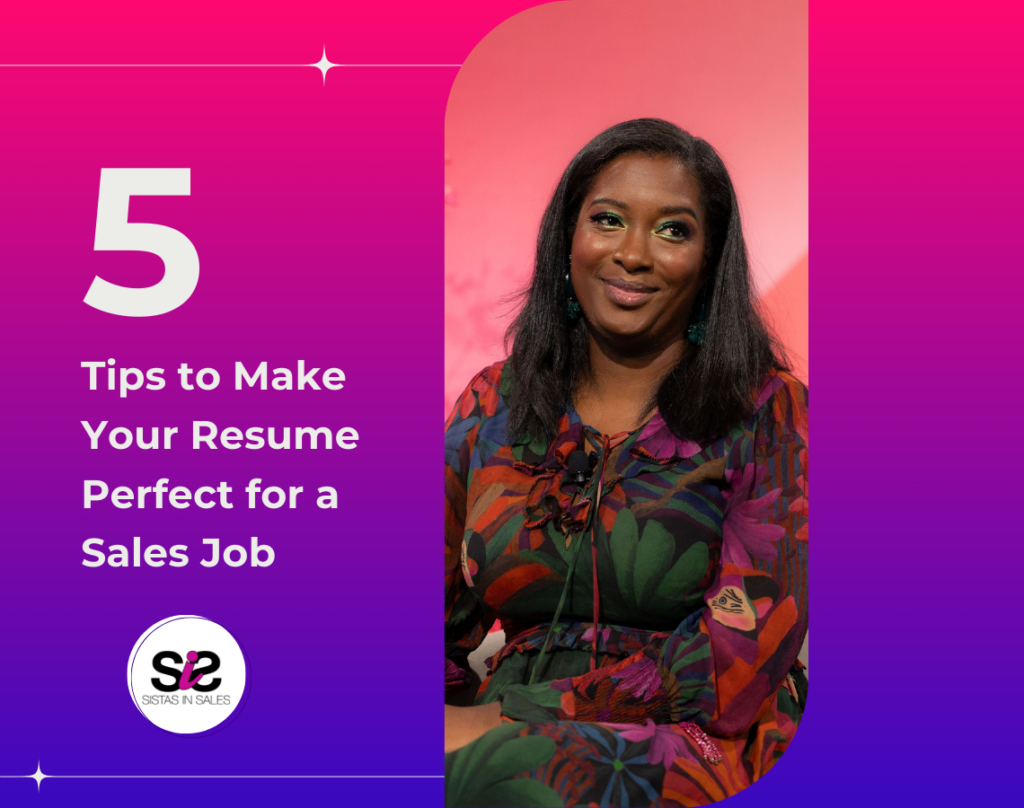
Entering the competitive world of sales can be a daunting prospect, especially for recent college graduates. If you’re just stepping into this field, you know that making a strong first impression is crucial. That’s where your resume comes in – it’s not just a document listing your experiences; it’s a powerful tool to showcase your potential, ambition, and the unique value you bring to the table. To help you navigate this journey, we’ve put together a comprehensive guide on crafting a resume that not only stands out but also opens doors to rewarding sales careers. Understanding What Employers Look ForSales employers are on the lookout for candidates who can demonstrate exceptional communication skills, resilience, adaptability, and a results-oriented mindset. These qualities should be the backbone of your resume, shaping how you present your experiences and skills. Structuring Your Resume for SuccessA well-structured resume makes a significant difference. Start with a clear heading and contact information, including a professional email address and a link to your polished LinkedIn profile. Follow this with a compelling summary statement that encapsulates your sales potential and eagerness to grow in the field. Education is more than just your degree; it’s a chance to highlight relevant coursework, projects, and extracurricular activities that have prepared you for a sales role. When it comes to experience, remember that every part-time job, internship, and volunteer opportunity has taught you valuable skills that are transferable to sales. Don’t forget to include any relevant skills and certifications that can give you an edge. Highlighting Your Unique ValueAs a woman of color, you bring unique experiences and perspectives that are incredibly valuable in sales. Use your resume to articulate these strengths, and don’t shy away from quantifying your achievements. Whether it’s leading a successful project in a student organization or initiating a community event, these experiences showcase your leadership and impact. Tailoring Your Resume for the Sales IndustryCustomization is key. Tailor your resume for each sales job application, incorporating keywords from the job description into your work experience and professional & skills summaries. This shows employers that you’re not only attentive but also highly interested in the role. Avoiding Common PitfallsEven the most impressive experiences can be overshadowed by simple mistakes like typos, generic statements, and overly lengthy resumes. Ensuring your resume is error-free and concise is as crucial as the information it contains. Seeking feedback from mentors or peers can provide invaluable insights and help polish your document to perfection. Utilizing Resources and NetworkingIn your journey to crafting the perfect sales resume, you’re not alone. Our “Ultimate Sales Success Toolkit” is an essential resource designed to guide you through this process. From understanding sales terminology to negotiating your worth and revamping your resume, this toolkit is your companion in achieving resume mastery. Moreover, attending the Aspiring Sellers Summit can supercharge your journey. This event is not just about learning from the best in the industry; it’s about connecting with a community that supports and uplifts each other. It’s an opportunity to showcase your ambition and dedication to prospective employers who are eager to meet talented individuals like you. ConclusionCrafting a standout resume is your first step towards a fulfilling career in sales. It’s about more than listing your experiences; it’s about telling your story in a way that resonates with employers and highlights your potential. Remember, your resume is a reflection of your ambition, skills, and the unique value you bring to any sales team. As you embark on this journey, don’t forget to leverage the tools and resources available to you. Are you ready to take the next step in your sales career and start crafting a resume that opens doors to new opportunities? Download the “Ultimate Sales Success Toolkit” and consider attending the Aspiring Sellers Summit to enhance your skills, network, and chances of landing your dream sales job. Your journey to sales success starts here!
